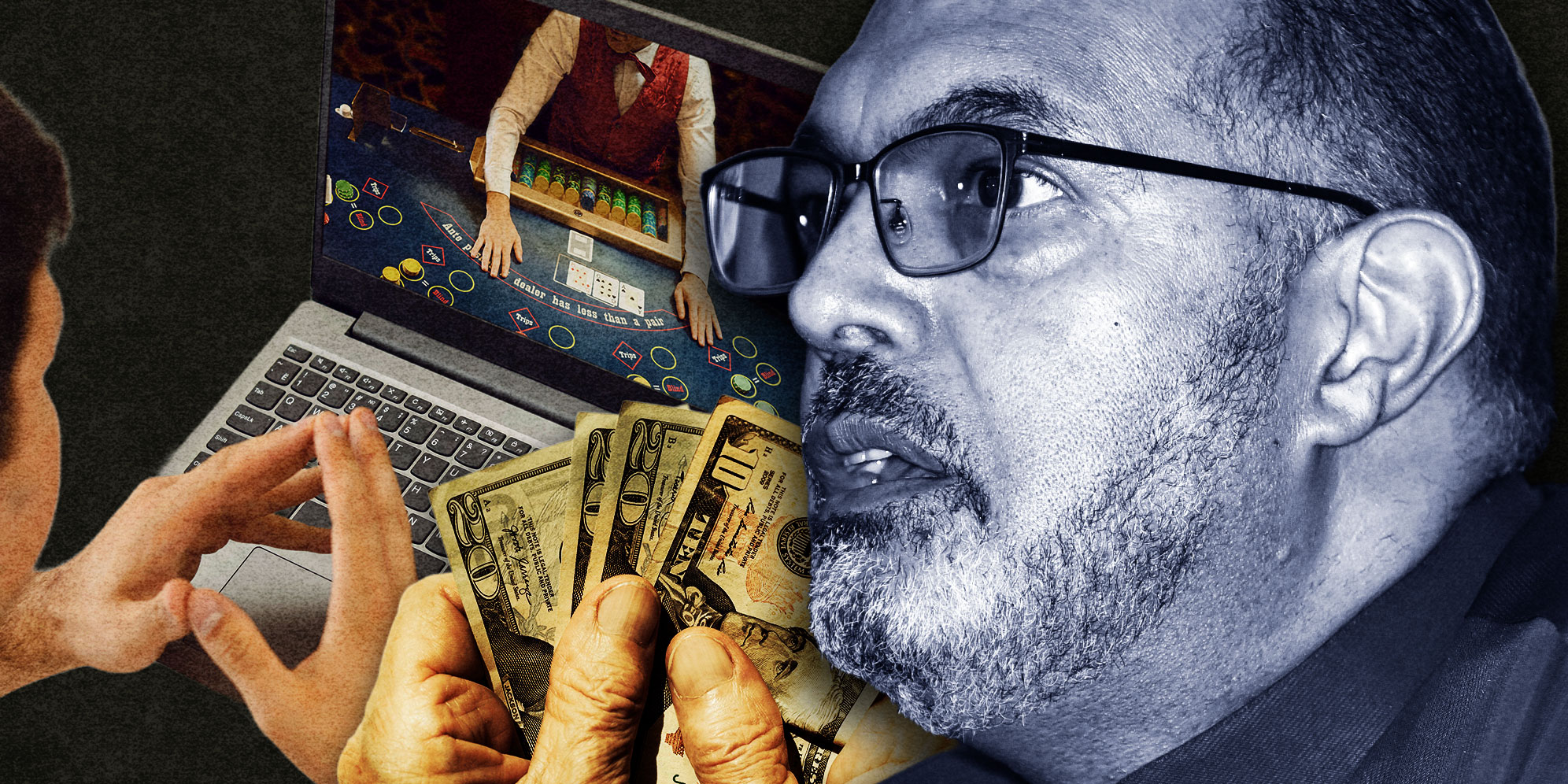A proliferation of gambling adverts and heightened awareness of the bigger role that gambling is playing in South Africa lead to a recent Daily Maverick investigation.
From students on the National Students Financial Aid Scheme using the money (intended to fund their studies) to feed their gambling addictions, to the impact of illegal gambling on legal bookies, the tentacles of this industry have spread far and wide.
Read more:
- Gambling’s old guard wants to curb SA’s online enthusiasm
- We need to get to grips with online gambling — start with banning ads
- ‘I cried for the first time because of gambling’: A 24-year-old’s struggle with addiction
A National Treasury draft proposal released on Tuesday, which relies heavily on information from the National Gambling Board, highlights a whopping 25% increase in gross gambling revenue (GGR; turnover or money staked minus winnings paid to players).
The proposal calls for a 20% national tax on the GGR of all licensed and unlicensed online gambling activities — which the Treasury reckoned could add up to R10-billion to the fiscus.
The National Gambling Board’s data for the 2024/2025 financial year indicate that about R1.50-trillion was wagered in the South African gambling industry during that period.
This was 31.3% higher than the turnover generated during the previous financial year. Most of the turnover came from betting and casinos. The betting sector generated 75% of turnover. Casinos accounted for 19.5%, while limited payout machines and bingo made up 3.6% and 1.8%, respectively.
/file/dailymaverick/wp-content/uploads/hello-i-m-nik-NYpOl-PJDkM-unsplash.jpg)
Source: National Gambling Board
“It is a great pity that Treasury did not consult with the industry orrelevant regulators, as adding additional taxes to gambling will make our industry one of the highest taxed gambling industries in the world. This will be over and above the VAT charge that only South Africa applies to gambling,” said Sun International’s CEO, Ulrik Bengtsson.
/file/attachments/2985/gamblingmetrics_181841_1a6034a87d20a7597e5b4450739b9fcb.jpg)
“Our offering is not a service where the price can simply be increased and passed back onto the customer. We are forced to absorb VAT charges, so additional taxes on gambling will effectively destabilise the legal gambling industry.”
While acknowledging that 70% of Sun International’s profits come from land-based properties, which this proposal does not target, Bengtsson is concerned that the proposed taxes will be detrimental to its online business.
/file/dailymaverick/wp-content/uploads/BM-Sasha-SunInt-1.jpg)
He said that during the first half of 2025, Sunbet (the group’s online gambling platform) generated R65-million in gaming taxes. These funds were distributed between North West (approximately 33%) and Mpumalanga (approximately 66%). According to Business Maverick’s calculations, Sunbet would have been liable for another R275-million in tax if the proposed tax had been in place for the six months to June 2025.
How will the proposed gambling tax work?
GGR refers to the money operators keep after paying out players’ winnings. The current tax rates are 6-9% for betting and 10-15% for casinos, which is paid to provincial tax authorities.
The contentious proposal is that all online gambling — including sports and horse-racing betting, online casino-style gaming and interactive gambling — would be charged 20% tax on GGR, payable to the SA Revenue Service. This would be in addition to the provincial taxes currently in play.
At first glance, an example of the new tax seems simple enough:
Let’s say that during February, the people gambling at XYZ Online Betting bet R100-million and were paid out R90-million in winnings. That would leave a GGR of R10-million.
The operator would then be liable for:
- National tax (20%) → R2-million; and
- Provincial tax (≈6-9%) → R0.6–R0.9-million.
- Total tax take on this example → R2.6–R2.9-million.
Sean Coleman, the CEO of the South African Bookmakers’ Association, pointed out that licensed bookmakers not only typically pay a provincial tax of 6.5% of gross profit in respect of online betting, but are also liable for 15% VAT on their GGR, which, when adjusted for the recovery of VATable expenses, translates into an effective combined rate of between 18% and 19%.
“If a further national tax at a flat rate of 20% of GGR is to be levied on licensed bookmakers, over and above the provincial taxes and VAT, the effective tax rate surges to between 38% and 39%,” he said.
/file/attachments/2985/gamblingtaxessnapshot_281054_abaaa2557db889da8ac35f3513851ced.jpg)
Source: National Gambling Board
“While harm minimisation, in the context of addictive or compulsive gambling, is of undeniable importance, it is difficult, if not impossible, to discern how the imposition of a punitive national 20% tax on providers of online betting, such as licensed bookmakers, will have the desired deterrent effect — or indeed any impact whatsoever — on the problem gambler or play any role in inducing a change in addictive gambling or betting patterns or habits," Coleman said.
Bengtsson maintained that the illegal operators that have flooded the SA market were the main source of the problem. He warned that the proposed gambling tax would not address this problem and could exacerbate it.
How big is the legal gambling industry in SA?
As at the end of the 2024/25 financial year, the National Gambling Board reported that in South Africa, there were:
- 36 operational casinos;
- 2,546 operational limited payout machines;
- 73 operational bingo outlets;
- 325 operational totalisator (tote) outlets; and
- 553 operational bookmaker outlets
Gambling revenue and jobs in 2024/25
/file/attachments/2985/gamblingrevenueandjobs_792749_a214c846d32557497c3545776f8942c3.jpg)
Source: National Gambling Board
Bengtsson said an independent report from the investigative company Yield Sec at the end of 2024 identified more than 2,000 offshore gambling sites operating in SA, indicating R55.1-billion or 62% of the country’s online GGR for 2023/4 leaving the country.
Growth of the illegal gambling market — globally
In an interview with Next.io, a publisher in the gaming industry, earlier this month, Ismail Valli, the founder of Yield Sec, said that Yield Sec raised the alarm in the UK in 2020, noting that 0.43% of the gambling market share was leaking to unlicensed operators — and it was growing fast.
Valli believes that the year ahead is going to be a tipping point in the international gambling market. “Significant marketplaces like the USA and Europe are about to hit that … negative tipping point — more than 75% of your marketplace is illegal, where most of the business has now been dominated by crime.”
Valli advocates focusing on what can be controlled. “Today, we took down 40,000 pieces of illegal gambling-promoting content. Tomorrow, we’re going to take down 4,000 websites and mirrors and redirects.”
Next.io reports that this approach has seen success in markets such as the Philippines, which has gone from a 91% illegal gambling market two years ago to a 50/50 legal and illegal split.
How do you tax an illegal activity?
Wayne Lurie, head of the South African Online Responsible Gambling Association and an attorney specialising in gambling regulatory law, raised the concern that the message to the illegal offshore market is effectively this: you may carry on offering products that the statute still treats as unlawful, provided that you calculate your gross gambling revenue carefully and pay a new national tax.
Lurie suggests that a better solution would be a clear national set of rules for interactive products, a sensible division of licensing responsibilities between the National Gambling Board and provincial boards, and harmonised technical and responsible gambling standards.
“Then, on that foundation, design a fiscal framework. If there is to be a national gambling tax on gross gambling revenue, its relationship with provincial levies should be transparent and agreed, not imposed from above.
“Rates should be set with explicit reference to both revenue and harm reduction, and should be reviewed periodically in light of evidence, not political pressure,” he said.
Lurie concluded with the cautionary note that any national tax that is justified by reference to social harm should be partially earmarked for addressing that harm.
“A properly allocated national responsible gambling fund, with clear governance and reporting, would do far more for credibility than a generic promise that extra money in the pot helps everyone,” he said. DM





 Illustrative image: SARS Commissioner Edward Kieswetter. (Photo: Freddy Mavunda / Business Day / Gallo Images) Money. Online gambling. (Photos: Freepix)
Illustrative image: SARS Commissioner Edward Kieswetter. (Photo: Freddy Mavunda / Business Day / Gallo Images) Money. Online gambling. (Photos: Freepix)